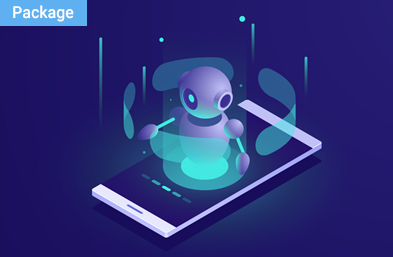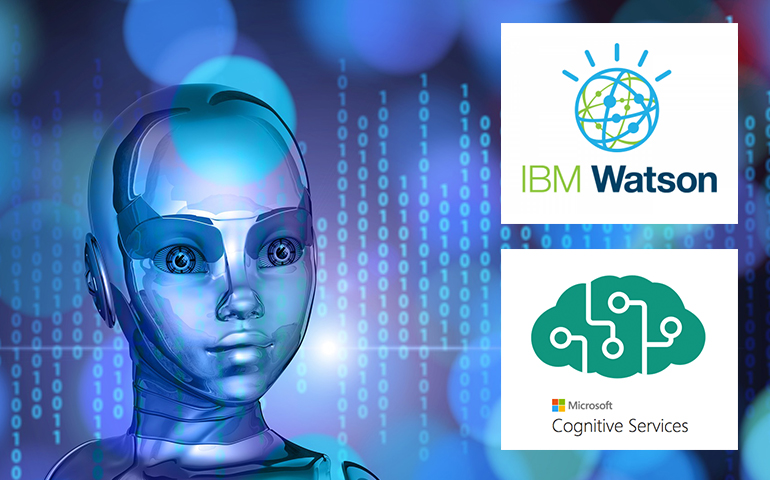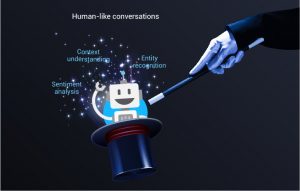Chatbots are a chat interface that enable a human conversation by understanding the context of communication using natural language processing (NLP). This enables programs to take inputs from humans in the form of text or voice to further analyze and provide logical responses.
You can develop a chatbot using cognitive services, as cognitive computing will empower the chatbot with a certain level of intelligence in communication like understanding the user’s needs based on their previous communication, recommendations given and more.
What is Cognitive Computing
A cognitive API or a cognitive computing API is an application toolkit using which it is easier to develop artificial intelligence and cognitive computing-based applications that generate business value from unstructured data. Cognitive computing is leveraged by feeding data into an intelligent algorithm that can analyze, understand correlations and learn from the data to automatically improve its intelligence. There are a lot of players in the cognitive computing landscape, but out of all of them, the two major ones are IBM & Microsoft.
Chatbots + Cognitive APIs = Personalized Experience
The APIs can be integrated into most modern platforms and languages. And, these APIs continuously learn, improve, and become smarter. Whether it is IBM Watson Services or Microsoft Cognitive Services, both are major players in the cognitive computing arena and have greatly contributed to creating powerful APIs to build an intelligent chatbot.
Develop smarter, faster and more intelligent chatbots with cognitive services APIs
Remove communication barriers with APIs for language translation
There are APIs that help in translating text from one language to another. IBM has two APIs for this purpose – Speech to Text and Text to Speech. It provides numerous domain-specific models that can be customized as per unique terminology as well as language.

AI-BASED CHATBOT IMPLEMENTATION STRATEGY
Softweb’s AI-based bot implementation strategy is specifically designed to help companies understand how to build and deploy intelligent chatbots.
Microsoft Translator Text API, on the other hand, provides a cloud-based translation service and supports more than 60 languages. Being a Microsoft service, it works well with all the other Microsoft products such as Office, Edge, SharePoint, Yammer, Visual Studio, Bing, and Skype.
For example, a business in the USA has a mobile application to serve their customer requests/complaints. If there is some Chinese customer not well-versed in writing English, then a language translator API can help in translating Chinese text into the English version.
Build chatbots that are capable of understanding emotions
With IBM’s Tone Analyzer you can perform linguistic analysis and detect seven types of tones which include frustration, satisfaction, excitement, politeness, impoliteness, sadness, and sympathy through verbal and textual conversations. This API can also detect sentiments in slang, emojis, and emoticons.
Similarly, Microsoft’s Text Analytics API detects topics, key phrases, sentiments, and language from the text. Hence, its right to use the MS API to separate negative sentiments from positive sentiments and, if sentiment details are needed, then one must make use of IBM’s Tone Analyzer API.
For example, if a customer sends a verbal or written complaint to a telecom chatbot, then the chatbot will be able to identify the issue and serve the customer with the right solution, which will eventually satisfy the customer, increasing customer loyalty.
Get information quickly and discover the hidden value in your data
If you have a business where users need to sift through a pile of documents for certain information, then you can develop a chatbot with cognitive services API such as IBM’s Watson Discovery or Microsoft’s QnA Maker API.
Watson Discovery would be the right choice if you want to find appropriate information or a document from the collection of documents. On the other hand, QnA Maker API helps in rapidly building, training, and deploying a question and answer chatbot that is based on FAQ URLs, documents or some structured list of questions and answers.
For example, an insurance company has various policy documents, legal information, and claim procedures. So, if a chatbot is developed by integrating Watson Discovery, then the insurer, insurance company employees, and other stakeholders can easily find the most pertinent information for their queries by using a combination of machine learning algorithms and search.
Using QnA Maker API, you can create a simple Q&A/FAQ/knowledge-based chatbot without coding. This chatbot will work on predefined content, so, if a user asks questions he will receive multiple responses from the database, containing phrases/keywords.
The final say
Both, IBM Watson Services and Microsoft Cognitive Services are popular cognitive computing platforms that offer powerful capabilities through ready-to-use APIs. All the above-mentioned APIs can perform different tasks, and they can solve different business challenges by creating engaging experiences for end users.
When you combine these cognitive computing APIs and overlay it with customized data analytics capabilities, it will provide you with insights and discoveries to make business decisions effortlessly. For more information about which cognitive API would your chatbot require, get cognitive consulting services from our experts.








